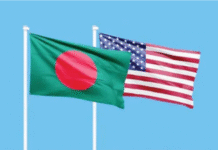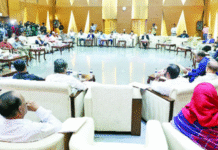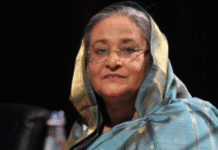
Image: Incumbent President Muhammadu Buhari, who is running for a second term of office, waves to his supporters at his election campaign rally in the northern state of Katsina, Nigeria, on Feb. 14, 2019. (Xinhua/Olatunji Obasa)
By Lisa Vives, Global Information Network
NEW YORK | LAGOS (IDN) — Election Day is around the corner in Nigeria and it’s approaching with new and troubling reports of violent attacks on candidates and their supporters.
Over the weekend (February 11-12), supporters of candidate Peter Obi reported being threatened by vandals carrying machetes and other weapons as they were making their way to a rally in Tafawa Balewa Square in Lagos.
Obi, a businessman and former governor of Anambra state, urged followers to go out on February 25 and vote for the Labor Party. “Stand there till they count the vote. Once we win the election that is the beginning of a new Nigeria.”
At the rally, Obi pledged he would reform the police to make it more professional, end the oil thefts that have hobbled production in the Niger Delta, and improve security to allow farmers to boost agriculture output.
In Lagos on February 10, two men were caught on a viral clip threatening residents and traders to make them vote for the ruling APC in the general elections or risk eviction from their community.
And in Delta State, three police officers were killed when gunmen ambushed the advance security team of Gov. Ifeanyi Okowa, the vice-presidential candidate of the People’s Democratic Party (PDP).
The Nigerian military has denied a charge by the governing party that it is planning to disrupt the upcoming presidential election.
An official from the APC party had said that generals held a secret meeting last week with the rival PDP presidential candidate Atiku Abubakar.
The allegations are “wicked” and “malicious”, said spokesperson for Nigeria’s Defense Headquarters Brigadier General Tukur Gusau. “The Armed Forces of Nigeria will never be part of any plot to truncate our hard-earned democracy.”
The International Crisis Group commented: “Amid widespread insecurity, there has been an uptick in election violence, which could escalate further during and after the polls.”
They blamed Intense acrimony, especially among the three major parties, which has raised tensions across the country. The ethnic, religious and regional identities of the candidates, and bombast from the front runners, have polarized the electorate. Failure to prosecute perpetrators of election violence is emboldening them to commit more such acts.
“Why does it matter? A peaceful election is crucial to the country’s cohesion and to its credibility in discouraging unconstitutional seizures of power elsewhere in Africa. A violent or disputed vote could aggravate Nigeria’s governance challenges and diminish its stature as a democratic leader on the continent.
“There is a chance, perhaps a small one, that no presidential candidate wins the 25 per cent of votes in two thirds of Nigeria’s states required to avoid a run-off. A second-round vote could bring additional perils.
“All the three main parties have proclaimed they expect to win in a landslide. All have strong motives to prevail, perhaps even more so than usual, raising concern that the losing parties – either in the first round or the run-off – may not readily accept defeat.” [IDN-InDepthNews – 13 February 2023]
Image: Incumbent President Muhammadu Buhari, who is running for a second term of office, waves to his supporters at his election campaign rally in the northern state of Katsina, Nigeria, on Feb. 14, 2019. (Xinhua/Olatunji Obasa)
IDN is the flagship agency of the Non-profit International Press Syndicate.









